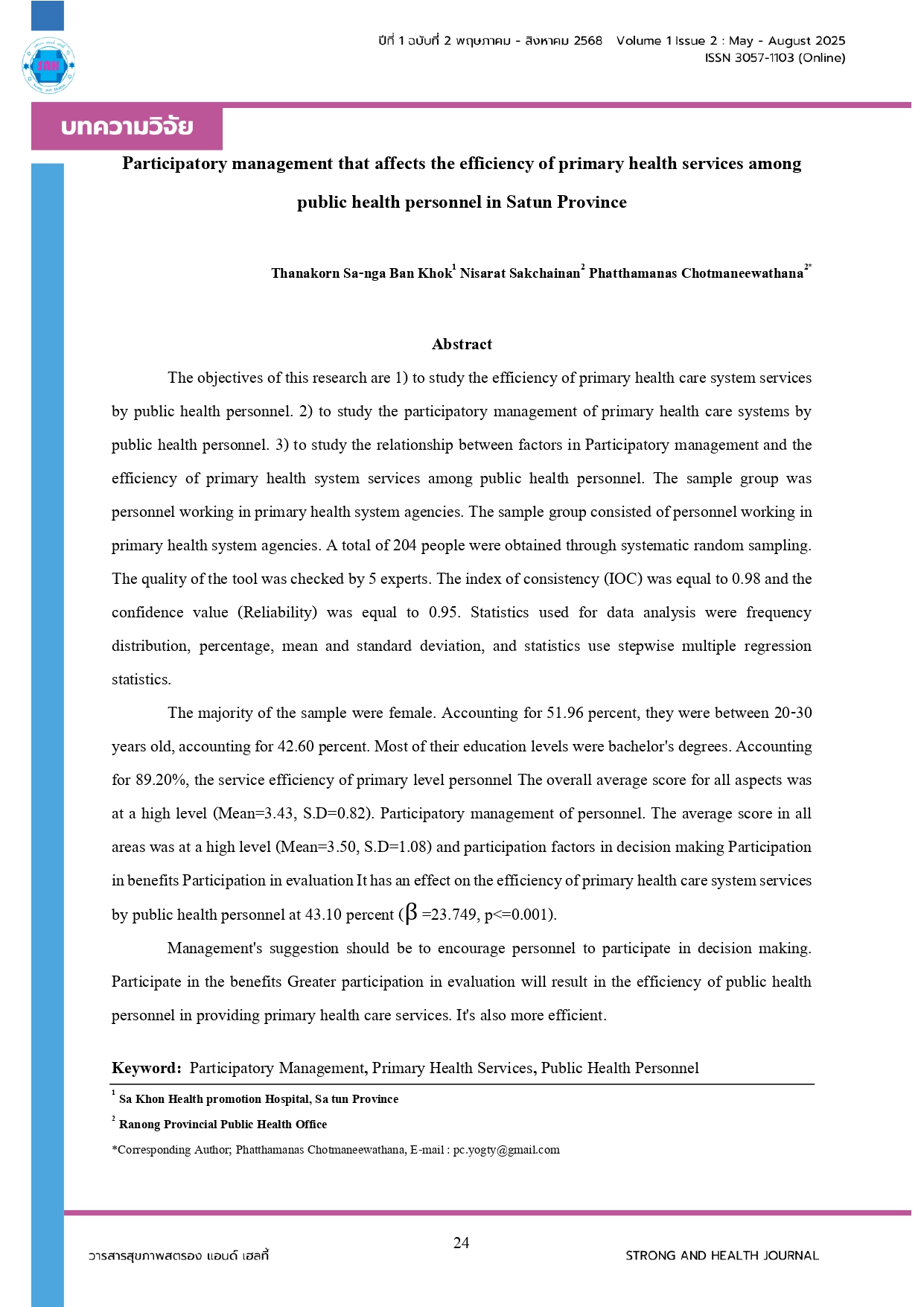Participatory management that affects the efficiency of primary health services among public health personnel in Satun Province
Main Article Content
Abstract
The objectives of this research are 1) to study the efficiency of primary health care system services by public health personnel. 2) to study the participatory management of primary health care systems by public health personnel. 3) to study the relationship between factors in Participatory management and the efficiency of primary health system services among public health personnel. The sample group was personnel working in primary health system agencies. The sample group consisted of personnel working in primary health system agencies. A total of 204 people were obtained through systematic random sampling. The quality of the tool was checked by 5 experts. The index of consistency (IOC) was equal to 0.98 and the confidence value (Reliability) was equal to 0.95. Statistics used for data analysis were frequency distribution, percentage, mean and standard deviation, and statistics use stepwise multiple regression statistics.
The majority of the sample were female. Accounting for 51.96 percent, they were between 20-30 years old, accounting for 42.60 percent. Most of their education levels were bachelor's degrees. Accounting for 89.20%, the service efficiency of primary level personnel The overall average score for all aspects was at a high level (Mean=3.43, S.D=0.82). Participatory management of personnel. The average score in all areas was at a high level (Mean=3.50, S.D=1.08) and participation factors in decision making Participation in benefits Participation in evaluation It has an effect on the efficiency of primary health care system services by public health personnel at 43.10 percent (β =23.749, p<=0.001).
Management's suggestion should be to encourage personnel to participate in decision making. Participate in the benefits Greater participation in evaluation will result in the efficiency of public health personnel in providing primary health care services. It's also more efficient.
Article Details

This work is licensed under a Creative Commons Attribution-NonCommercial-NoDerivatives 4.0 International License.
References
ชนะพล ศรีฤาชา และณัฐธิมา ต่อศรี. (2558). แรงจูงใจของเภสัชกรที่มีผลต่อการพัฒนาคุณภาพระบบบริการเพื่อมุ่งสู่การรับรองคุณภาพโรงพยาบาลของฝ่ายเภสัชกรรมในโรงพยาบาล ชุมชน จังหวัดชัยภูมิ. วารสารสำนักงานป้องกันควบคุมโรคที่ 7 ขอนแก่น, 22(2), 1–10.
ประชาภรณ์ ทัพโพธิ์. (2557). ปัจจัยที่มีผลต่อการมีส่วนร่วมของบุคลากรในการพัฒนาคุณภาพ
โรงพยาบาลส่งเสริมสุขภาพตำบล จังหวัดนครปฐม. (วิทยานิพนธ์ปริญญาศิลปะศาสตรมหาบัณฑิต ตีพิมพ์).
มหาวิทยาลัยเกษตรศาสตร์ วิทยาเขตกำแพงแสน , นครปฐม.
ปราณี ประวิชพราหมณ์. (2556). ปัจจัยที่ส่งผลต่อแรงจูงใจในการปฏิบัติงานของบุคลากรในคณะ
ศิลปศาสตร์ มหาวิทยาลัยเทคโนโลยีราชมงคลพระนคร.รายงานการวิจัย คณะศิลปะศาสตร์มหาวิทยาลัย
เทคโนโลยีราชมงคลพระนคร.
เพ็ญพิชชา ล้วนดี. (2556). แรงจูงใจและความพึงพอใจในการปฏิบัติงานของพยาบาลวิชาชีพ
โรงพยาบาลบ้านแพ้ว (องค์การมหาชน). (การค้นคว้าอิสระปริญญาวิทยาศาสตรมหาบัณฑิต ไม่ได้ตีพิมพ์).
มหาวิทยาลัยศิลปากร, กรุงเทพฯ.
วิษณุ สุมิตสวรรค์ เพ็ญณี แนรอธ และวงศ์พัทธ์ นามบุดดี. (2560). แรงจูงใจในการทำงานอย่างมี
ความสุขของพนักงานเทศบาล เทศบาลนครขอนแก่น จังหวัดขอนแก่น.วารสารสันติศึกษาปริทรรศน์ มจร,
(3) 226-236.
ศิรินทร์ทิพย์ บุญด้วยลาน และปรียากมล ข่าน. (2557). ความสัมพันธ์ระหว่างปัจจัยส่วนบุคคล ภาวะ
ผู้นำการเปลี่ยนแปลงของหัวหน้าหอผู้ป่วย การทำงานเป็นทีมกับความยึดมั่นผูกพันต่อองค์การของพยาบาล
วิชาชีพในศูนย์การแพทย์สมเด็จพระเทพรัตนราชสุดาฯสยามราชกุมารี. วารสารพยาบาลสาธารณสุข, 28(3),
-69.
สถาพร รัตนวารีวงษ์. (2557). ปัจจัยที่มีความสัมพันธ์กับการมีส่วนร่วมในการพัฒนาและรับรอง
คุณภาพโรงพยาบาลของบุคลากรสาธารณสุขในโรงพยาบาลชุมชน จังหวัดบึงกาฬ.(วิทยานิพนธ์ปริญญา
สาธารณสุขศาสตรมหาบัณฑิต ตีพิมพ์). มหาวิทยาลัยสุโขทัยธรรมาธิราช, นนทบุรี.
อนุวัฒน์ ศุภชุติกุล และกิตตินันท์ อนรรฆมณี. (2560). คุณภาพบริการสุขภาพสู่สังคมไทยในฝัน.ใน
HA 2017 UPDATE. นนทบุรี: หนังสือดีวัน.(หน้า 81-93)


